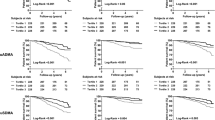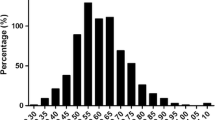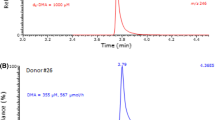Abstract
Asymmetric dimethylarginine (ADMA) is a methylated form of arginine and an endogenous nitric oxide synthase inhibitor. Renal function decline is associated with increase of plasma ADMA in chronic kidney disease populations. It is yet unknown how isolated renal function impairment affects ADMA homeostasis in healthy humans. Here, we measured plasma concentrations and urinary excretion of ADMA using GC–MS/MS in 130 living kidney donors before and at 1.6 (1.6–1.9) months after donation. We additionally analyzed 201 stable renal transplant recipients (RTR) that were included > 1 year after transplantation, as a model for kidney disease in the context of single kidney state. We measured true glomerular filtration rate (mGFR) using 125I-iothalamate. To study enzymatic metabolism of ADMA, we also measured l-citrulline as primary metabolite. Mean age was 52 ± 10 years in donors and 54 ± 12 years in RTR. Renal function was significantly reduced from pre- to post-donation (mGFR: 104 ± 17 vs. 66 ± 10 ml/min per 1.73 m2 BSA, − 36 ± 7%, P < 0.001). Urinary ADMA excretion strongly and significantly decreased from pre- to post-donation (60.6 ± 16.0 vs. 40.5 ± 11.5 µmol/24 h, − 31.5 ± 21.5%, P < 0.001), while plasma ADMA increased only slightly (0.53 ± 0.08 vs. 0.58 ± 0.09 µM, 11.1 ± 20.1%, P < 0.001). Compared to donors post-donation, RTR had significantly worse renal function (mGFR: 49 ± 18 ml/min/1.73 m2, − 25 ± 2%, P < 0.001) and lower urinary ADMA excretion (30.9 ± 12.4 µmol/24 h, − 23.9 ± 3.4%, P < 0.001). Plasma ADMA in RTR (0.60 ± 0.11 µM) did not significantly differ from donors post-donation (2.9 ± 1.9%, P = 0.13). Plasma citrulline was inversely associated with mGFR (st. β: − 0.23, P < 0.001), consistent with increased ADMA metabolism to citrulline with lower GFR. In both groups, the response of urinary ADMA excretion to renal function loss was much larger than that of plasma ADMA. As citrulline was associated with GFR, our data indicate that with renal function impairment, a decrease in urinary ADMA excretion does not lead to a corresponding increase in plasma ADMA, likely due to enhanced metabolism, thus allowing for lower renal excretion of ADMA.



Similar content being viewed by others
Abbreviations
- ADMA:
-
Asymmetric dimethylarginine
- AGXT2:
-
Alanine-glyoxylate aminotransferase 2
- BMI:
-
Body mass index
- BSA:
-
Body surface area
- CKD:
-
Chronic kidney disease
- CKD-EPI:
-
Chronic Kidney Disease Epidemiology Collaboration
- DBP:
-
Diastolic blood pressure
- DDAH:
-
Dimethylarginine dimethylaminohydrolase
- DMA:
-
Dimethylamine
- eGFR:
-
Estimated glomerular filtration rate
- FE:
-
Fractional excretion
- GC–MS/MS:
-
Gas chromatography–tandem mass spectrometry
- GFR:
-
Glomerular filtration rate
- mGFR:
-
Measured glomerular filtration rate
- NO:
-
Nitric oxide
- PRMT:
-
Protein arginine methyltransferase
- RTR:
-
Renal transplant recipient
- SBP:
-
Systolic blood pressure
- SD:
-
Standard deviation
- SDMA:
-
Symmetric dimethylarginine
- UHPLC–MS/MS:
-
Ultra-high performance liquid chromatography–tandem mass spectrometry
References
Achan V, Broadhead M, Malaki M et al (2003) Asymmetric dimethylarginine causes hypertension and cardiac dysfunction in humans and is actively metabolized by dimethylarginine dimethylaminohydrolase. Arterioscler Thromb Vasc Biol 23:1455–1459. https://doi.org/10.1161/01.ATV.0000081742.92006.59
American Diabetes Association (2008) Diagnosis and classification of diabetes mellitus. Diabetes Care 31(Suppl 1):S55–S60. https://doi.org/10.2337/dc08-S055
Apperloo AJ, de Zeeuw D, Donker AJ, de Jong PE (1996) Precision of glomerular filtration rate determinations for long-term slope calculations is improved by simultaneous infusion of 125I-iothalamate and 131I-hippuran. J Am Soc Nephrol 7:567–572
Böger RH, Bode-Böger SM, Szuba A et al (1998) Asymmetric dimethylarginine (ADMA): a novel risk factor for endothelial dysfunction: its role in hypercholesterolemia. Circulation 98:1842–1847. https://doi.org/10.1161/01.CIR.98.18.1842
Du Bois D, Du Bois EF (1916) A formula to estimate the approximate surface area if height and weight be known. Nutrition 5:303–311; discussion 312–3. https://doi.org/10.1001/archinte.1916.00080130010002
Caplin B, Wang Z, Slaviero A et al (2012) Alanine-glyoxylate aminotransferase-2 metabolizes endogenous methylarginines, regulates NO, and controls blood pressure. Arterioscler Thromb Vasc Biol 32:2892–2900. https://doi.org/10.1161/ATVBAHA.112.254078
Chen KW, Wu MWF, Chen Z et al (2016) Compensatory hypertrophy after living donor nephrectomy. Transplant Proc 48:716–719. https://doi.org/10.1016/j.transproceed.2015.12.082du
Engeli S, Tsikas D, Lehmann AC et al (2012) Influence of dietary fat ingestion on asymmetrical dimethylarginine in lean and obese human subjects. Nutr Metab Cardiovasc Dis 22:720–726. https://doi.org/10.1016/j.numecd.2011.01.002
Fliser D, Kronenberg F, Kielstein JT et al (2005) Asymmetric dimethylarginine and progression of chronic kidney disease: the mild to moderate kidney disease study. J Am Soc Nephrol 16:2456–2461. https://doi.org/10.1681/ASN.2005020179
Frenay A-RS, van den Berg E, de Borst MH et al (2015) Plasma ADMA associates with all-cause mortality in renal transplant recipients. Amino Acids 47:1941–1949. https://doi.org/10.1007/s00726-015-2023-0
Heymsfield SB, Arteaga C, McManus C et al (1983) Measurement of muscle mass in humans: validity of the 24-hour urinary creatinine method. Am J Clin Nutr 37:478–494. https://doi.org/10.1093/ajcn/37.3.478
Inker LA, Schmid CH, Tighiouart H et al (2012) Estimating glomerular filtration rate from serum creatinine and cystatin C. N Engl J Med 367:20–29. https://doi.org/10.1056/NEJMoa1114248
Jha V, Garcia-Garcia G, Iseki K et al (2013) Chronic kidney disease: global dimension and perspectives. Lancet (London, England) 382:260–272. https://doi.org/10.1016/S0140-6736(13)60687-X
Kakimoto Y, Akazawa S (1970) Isolation and identification of N-G, N-G- and N-G, N′-G-dimethyl-arginine, N-epsilon-mono-, di-, and trimethyllysine, and glucosylgalactosyl- and galactosyl-delta-hydroxylysine from human urine. J Biol Chem 245:5751–5758
Kayacelebi AA, Langen J, Weigt-Usinger K et al (2015) Biosynthesis of homoarginine (hArg) and asymmetric dimethylarginine (ADMA) from acutely and chronically administered free l-arginine in humans. Amino Acids 47:1893–1908. https://doi.org/10.1007/s00726-015-2012-3
Kielstein JT, Zoccali C (2005) Asymmetric dimethylarginine: a cardiovascular risk factor and a uremic toxin coming of age? Am J Kidney Dis 46:186–202. https://doi.org/10.1053/j.ajkd.2005.05.009lin
Kielstein JT, Impraim B, Simmel S et al (2004) Cardiovascular effects of systemic nitric oxide synthase inhibition with asymmetrical dimethylarginine in humans. Circulation 109:172–177. https://doi.org/10.1161/01.cir.0000105764.22626.b1
Lin KY, Ito A, Asagami T et al (2002) Impaired nitric oxide synthase pathway in diabetes mellitus: role of asymmetric dimethylarginine and dimethylarginine dimethylaminohydrolase. Circulation 106:987–992. https://doi.org/10.1161/01.cir.0000027109.14149.67
Martens-Lobenhoffer J, Rodionov RN, Drust A, Bode-Böger SM (2011) Detection and quantification of α-keto-δ-(NG, NG-dimethylguanidino)valeric acid: a metabolite of asymmetric dimethylarginine. Anal Biochem 419:234–240. https://doi.org/10.1016/j.ab.2011.08.044
Matsuguma K, Ueda S, Yamagishi S-I et al (2006) Molecular mechanism for elevation of asymmetric dimethylarginine and its role for hypertension in chronic kidney disease. J Am Soc Nephrol 17:2176–2183. https://doi.org/10.1681/asn.2005121379
Morris SM (2016) Arginine metabolism revisited. J Nutr 146:2579S–2586S. https://doi.org/10.3945/jn.115.226621
Nijveldt RJ, Van Leeuwen PAM, Van Guldener C et al (2002) Net renal extraction of asymmetrical (ADMA) and symmetrical (SDMA) dimethylarginine in fasting humans. Nephrol Dial Transplant 17:1999–2002
Ogawa T, Kimoto M, Watanabe H, Sasaoka K (1987) Metabolism of NG, NG- and NG, NG-dimethylarginine in rats. Arch Biochem Biophys 252:526–537. https://doi.org/10.1016/0003-9861(87)90060-9
Rodionov RN, Murry DJ, Vaulman SF et al (2010) Human alanine-glyoxylate aminotransferase 2 lowers asymmetric dimethylarginine and protects from inhibition of nitric oxide production. J Biol Chem 285:5385–5391. https://doi.org/10.1074/jbc.M109.091280
Rodionov RN, Martens-Lobenhoffer J, Brilloff S et al (2014) Role of alanine: glyoxylate aminotransferase 2 in metabolism of asymmetric dimethylarginine in the settings of asymmetric dimethylarginine overload and bilateral nephrectomy. Nephrol Dial Transplant 29:2035–2042. https://doi.org/10.1093/ndt/gfu236
Servillo L, Giovane A, Cautela D et al (2013) The methylarginines NMMA, ADMA, and SDMA are ubiquitous constituents of the main vegetables of human nutrition. Nitric Oxide Biol Chem 30:43–48. https://doi.org/10.1016/j.niox.2013.02.080
Siroen MPC, Van Der Sijp JRM, Teerlink T et al (2005) The human liver clears both asymmetric and symmetric dimethylarginine. Hepatology 41:559–565. https://doi.org/10.1002/hep.20579
Taner T, Iqbal CW, Textor SC et al (2015) Compensatory hypertrophy of the remaining kidney in medically complex living kidney donors over the long term. Transplantation 99:555–559. https://doi.org/10.1097/tp.0000000000000356
Teerlink T (2005) ADMA metabolism and clearance. Vasc Med 10(Suppl 1):S73–S81. https://doi.org/10.1191/1358863x05vm597oa
Tojo A, Welch WJ, Bremer V et al (1997) Colocalization of demethylating enzymes and NOS and functional effects of methylarginines in rat kidney. Kidney Int 52:1593–1601
Tomlinson JAP, Caplin B, Boruc O et al (2015) Reduced renal methylarginine metabolism protects against progressive kidney damage. J Am Soc Nephrol 26:3045–3059. https://doi.org/10.1681/ASN.2014030280
Tsikas D, Schubert B, Gutzki FM et al (2003) Quantitative determination of circulating and urinary asymmetric dimethylarginine (ADMA) in humans by gas chromatography-tandem mass spectrometry as methyl ester tri(N-pentafluoropropionyl) derivative. J Chromatogr B Anal Technol Biomed Life Sci 798:87–99. https://doi.org/10.1016/j.jchromb.2003.09.001
van den Berg E, Engberink MF, Brink EJ et al (2012) Dietary acid load and metabolic acidosis in renal transplant recipients. Clin J Am Soc Nephrol 7:1811–1818. https://doi.org/10.2215/CJN.04590512
van den Berg E, Engberink MF, Brink EJ et al (2013) Dietary protein, blood pressure and renal function in renal transplant recipients. Br J Nutr 109:1463–1470. https://doi.org/10.1017/S0007114512003455
van Londen M, Wijninga AB, de Vries J et al (2018) Estimated glomerular filtration rate for longitudinal follow-up of living kidney donors. Nephrol Dial Transplant 33:1054–1064. https://doi.org/10.1093/ndt/gfx370
Weiner ID, Mitch WE, Sands JM (2015) Urea and ammonia metabolism and the control of renal nitrogen excretion. Clin J Am Soc Nephrol 10:1444–1458. https://doi.org/10.2215/CJN.10311013
Wolf C, Lorenzen JM, Stein S et al (2012) Urinary asymmetric dimethylarginine (ADMA) is a predictor of mortality risk in patients with coronary artery disease. Int J Cardiol 156:289–294. https://doi.org/10.1016/j.ijcard.2010.11.003
Wyss M, Kaddurah-Daouk R (2000) Creatine and creatinine metabolism. Physiol Rev 80:1107–1213. https://doi.org/10.1152/physrev.2000.80.3.1107
Zoccali C, Benedetto FA, Maas R et al (2002) Asymmetric dimethylarginine, C-reactive protein, and carotid intima-media thickness in end-stage renal disease. J Am Soc Nephrol 13:490–496
Acknowledgements
N. de Ruiter, E. Jonkers, P de Blaauw, and J. van der Krogt, technicians of the laboratory of metabolic diseases, are gratefully acknowledged for citrulline and arginine analyses. Funding was provided by Stichting voor de Technische Wetenschappen (NL) & DSM Animal Nutrition and Health (14939).
Author information
Authors and Affiliations
Corresponding author
Ethics declarations
Conflict of interest
R. M. Douwes is supported by the applied science division of the Dutch Technology Foundation (Stichting voor Technische Wetenschappen-Nederlandse Organisatie voor Wetenschappelijk Onderzoek; STW-NWO) in a partnership program with DSM Animal Nutrition and Health, a manufacturer of animal nutrition and nutritional products; project number: 14939.
Informed consent and ethical approval
All procedures performed in this study were in accordance with the ethical standards of the institutional and national research committee and with the 1964 Helsinki declaration and its later amendments or comparable ethical standards. This article does not contain any studies with animals performed by any of the authors. Informed consent was obtained from all individual participants included in the study.
Additional information
Handling Editor: S. S. Gross.
Publisher's Note
Springer Nature remains neutral with regard to jurisdictional claims in published maps and institutional affiliations.
Rights and permissions
About this article
Cite this article
Said, M.Y., Douwes, R.M., van Londen, M. et al. Effect of renal function on homeostasis of asymmetric dimethylarginine (ADMA): studies in donors and recipients of renal transplants. Amino Acids 51, 565–575 (2019). https://doi.org/10.1007/s00726-018-02693-z
Received:
Accepted:
Published:
Issue Date:
DOI: https://doi.org/10.1007/s00726-018-02693-z




